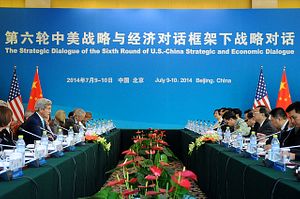J. Michael Cole caught me red-handed. He is right that I have organized – with Patrick C.P. Ho, the deputy chairman and secretary general of the China Energy Fund Committee – a conference on Sino-American relations. Our conference, to be held on October 5 in Washington, D.C., takes place in the context of rising tensions between the United States and China. As someone who was involved in combat for two and a half years, I much prefer that people, even enemies, talk to each other rather than shoot each other; this is what this conference is all about. (And the U.S. and China are hardly enemies.)
In the United States, candidates for both the Democratic and Republican presidential nominations are competing to be the “toughest” on China. Select American defense corporations would much rather build costly F-35s, submarines, and destroyers than the relatively low-cost stuff needed to fight terrorists. China has its own aggressive voices and seems ignorant of the fact that its moves to regain control of insignificant islands are highly provocative. It too is engaged in a military buildup. Moreover, several influential voices in both nations hold that when a new power arises, the old power will not yield power quickly enough to avoid conflict, and that war is thus “inevitable.”
In this context, Mr. Ho and I organized a conference dedicated to exploring opportunities to reduce tensions between the United States and China. In the past, a group which I helped organize, which discussed “mutually assured restraint,” made similar efforts. James Steinberg and Michael O’Hanlon published a book called Strategic Reassurance and Resolve. Lyle Goldstein wrote a relevant book called Meeting China Halfway.
People tend to treat unanswered charges as if the object of the charges has validated them; hence I am responding to the specific points raised by Mr. Cole. First of all, my think tank’s funding comes exclusively from individual contributions from American citizens, none of whom put any condition on the use of the funds. They believe in the value of our communitarian work. We received no government funds. Second, Mr. Ho has been a perfect partner. Far from bringing Chinese propaganda to Washington, he did not advocate for the presentation of any particular viewpoint at the conference, nor did he seek to influence our selection of speakers. The only substantive comment he made to me during discussions about the conference, once we agreed about its focus, was that “we should not demonize Japan.”
Third, regarding Taiwan, Mr. Cole, who works for the Thinking Taiwan Foundation, which commentators to his article noted is a government supported propaganda outfit, is correct to point out that one speaker at the conference favors a “grand bargain” between the United States and China, which many in Taiwan may well not favor. As for myself, I previously pointed to the fact that China and the United States have agreed that the United States will not recognize Taiwan as an independent state, in exchange for which China will not use force to integrate Taiwan into the mainland. I did suggest that if this agreement were to be made explicit, it could help to reduce tensions. None of this amounts to denying Taiwan its voice.
Fourth, I am confident that those who attend the conference, which is open to all free of charge, will note a considerable variety of viewpoints – a long way from propaganda. Most of us are interested in finding ways to help both countries live in peace with each other and resolve differences in a constructive and honorable way, rather than yielding to the siren calls of nationalists on both sides. The United States and China badly need to use their resources for nation-building at home rather than investing them in arms, which at best will never be used and at worst will be used for massive killing and suffering. If this is what Mr. Cole opposes, then indeed I am guilty as charged for giving voice to a variety of “doves.”
Amitai Etzioni is a University Professor and Professor of International Affairs at The George Washington University. He is also the author of Hot Spots and, most recently, Privacy in a Cyber Age. You can follow his work on Twitter, Facebook, and YouTube, or at www.icps.gwu.edu.
































